| 30 January |
• yesterday • tomorrow |
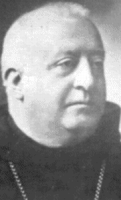
• Joseph Marmion
• Joseph Aloysius Marmion
Son of an Irish father, William Marmion, and French mother, Herminie Cordier. He entered the seminary in Dublin, Ireland in 1874, and studied at the College for the Propagation of the Faith in Rome, Italy from 1876. Ordained in Rome on 16 June 1881.
He dreamed of becoming a missionary monk in Australia, but spent several years as a parish priest in Dublin. Curate in Dundrum, and professor at the seminary at Clonliffe from 1882 to 1886. Chaplain and spiritual director of a Redemptorist convent and a women's prison.
In 1886 he renounced his promising ecclesiastical career, and entered the Benedictine Abbey of Maredsous in Belgium, taking the name Columba. Nearly 30 at the time of his noviate, and forced to learn a new language at the same time, he persevered and made his solemn profession on 10 February 1891.
Helped found the abbey of Mont César at Leuven, Belgium; served as its prior, spiritual director, and professor of theology and philosophy to younger monks. Began preaching retreats in Belgium and Britain. Spiritual director to communities of Carmelite nuns. Researcher and editor of several publications, including Revue Bénédictine. Elected abbot of Maradsous on 28 September 1909, a position he held the rest of his life.
During his time as abbot, Maredsous, famous for its beer and cheese, became a focal point for spiritual thinking in Europe. Worked for the union of Anglican Benedictine houses with Rome, and helped a house of Anglican monks who converted to Catholicism. Counselor to Queen Elisabeth of Belgium.
While the walls stood, World War I effectively destroyed his abbey. German lay-brothers, who had been there for years, were expelled from Belgium. Columba sent young monks to study in Ireland; they would be safer there, but the remaining brothers, including Columba, had to shoulder more work. After the war, a group of the brothers were sent to the Monastery of the Dormitian in Jerusalem, which had been left nearly deserted when the British expelled German monks. Amidst it all, Columba continued to preach retreats, guide the lost, and write.
The investigation for his Cause began on 7 February 1957, and the healing of a Minnesota woman in 1966 was performed through his intercession.
1 April (Holy Thursday) 1858 at 57 Queen Street, Dublin, Ireland as Joseph Aloysius Marmion
30 January 1923 at Maredsous Abbey, Denée, Namur, Belgium of influenza
3 September 2000 by Pope John Paul II at Saint Peter's Basilica, Rome, Italy
• Christ in His Mysteries (1919)
• Christ the Ideal of the Monk (1922)
• Christ the Life of the Soul (1917)
• Growth in Christ
• The Virgin Consecrated to Christ
• The Mysteries of the Rosary
• Joyful and Glorious Mysteries
• The Structure of God's Plan
O Lord, our God, You have given Your servant, Columba, to understand so well that by our Baptism we are Your adopted children and brothers and sisters of Jesus Christ: as a good Father graciously hear the prayers which we address to You to obtain through his intercession this favor. Teach us by his example and doctrine how to live generously as true Christians with a childlike confidence and a simplicity abounding in love. Likewise, is such is Your pleasure, show clearly by miracles, how pleasing Your servant is to You, so that Holy Mother Church may be able to declare him a Saint. Through Jesus Christ our Lord. Amen. - prayer for the Canonization of Dom Columba Marmion
https://catholicsaints.info/blessed-columba-marmion/
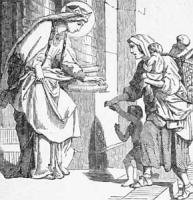
Baldechilde, Baldhild, Bathild, Bathildes, Bathildis, Bauteur
Kidnapped in her youth from her native England and sold into slavery in France to Erkenwald, the Mayor of the Palace of King Clovis II. When grown, she was placed in charge of the household. Married King Clovis II in 649. Queen. Mother of three sons, all of whom became kings: Clotaire III, Childeric II and Thierry I. She used her royal position to protect the Church, and help the poor. Widowed in 655. Regent. Upon taking her late husband's power, she immediately forbade the enslavement of Christians. Endowed religious houses, including Chells Abbey, and helped the work of Saint Eligius. In 665, when her son Clotaire was 15, she handed the throne over to him, and entered Chelles Abbey, spending the rest of her life in prayer and care of the sick.
c.630 in England
• 30 January 680 of natural causes
• buried in the Abbey of Chelles
by Pope Nicholas I
• against bodily ills
• against illness
• against sickness
• children
• sick people
• widows
• crowned nun often performing menial tasks or giving alms to the poor
• ladder extending into heaven
• standing before an altar of the Blessed Virgin Mary
https://catholicsaints.info/saint-bathilde/
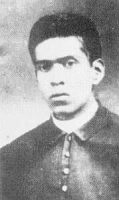
21 May as one of the Martyrs of the Mexican Revolution
Entered the seminary in Guadalajara, Mexico at age 14. An excellent student. Questioning his vocation, David left the seminary for three years. He worked, dated, wasted his time, and lived a dissolute lifestyle; at one point he was arrested for hitting his girlfriend while he was drunk. However, he finally realized he could not ignore the call to his vocation. After a year's probation, he was allowed to return to the seminary. Ordained on 20 May 1909. Seminary instructor at Amatitán. Supervisor at the Amatitán seminary.
Arrested at least one for the crime of priesthood. During periods of armed rebellion, he went into the field of fire to work with the injured, patching wounds and hearing confessions. On his way to Guadalajara to help victims of armed street fighting, he was arrested with Father Jose Araíza, who was later ransomed out of prison. Murdered for being a priest, and on the chance that he might be helping the rebels. Comforted fellow prisoners and heard confessions in the hours before execution. Martyr.
29 January 1881 at Guadalajara, Jalisco, Mexico
shot by firing squad on 30 January 1915 at Guadalajara, Jalisco, Mexico
21 May 2000 by Pope John Paul II during the Jubilee of Mexico
What greater glory is there than to die saving a soul? - Saint David, on his way to minister to the wounded in a fire fight
https://catholicsaints.info/saint-david-galvan-bermudez/
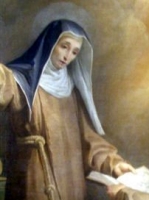
Giacinta Marescotti
Born to the Italian nobility. Educated in a Franciscan convent. Franciscan tertiary at Saint Bernardine's convent in Viterbo, Italy for ten years, though with no real enthusiasm; she used her personal funds to insure comfortable lodgings, and none of the privations of the other tertiaries. A serious illness caused Hyacintha's confessor to bring her Communion, which allowed him to see her rooms for the first time. Scandalized at the life she provided herself, the priest told her to live more humbly. Hyacintha took his advice, became humble in her food and dress, did the most menial work in the convent, and replaced her bed with a few bare boards. She became an exceptional mistress of novices, and developed a special appeal for "those who are despised, who are devoid of self-love and who have little sensible consolation." Over the years she developed a special devotion to the sufferings of Christ and, by her penances, became an inspiration to the sisters in her convent. Foundress of the Sacconi or Oblates of Mary, dedicated to working with the aged poor.
1585 near Viterbo, Italy
30 January 1640 at Viterbo, Italy of natural causes
1 September 1726 by Pope Benedict XIII
24 May 1807 by Pope Pius VII
https://catholicsaints.info/saint-hyacintha-of-mariscotti/
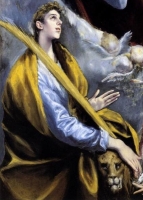
Wealthy daughter of a Christian Roman consul. On her parent's death, she gave away her riches to the poor and devoted herself to prayer. Tortured and martyred in the persecutions of Alexander Severus for refusing to sacrifice to pagan gods. A basilica is dedicated to her at the Roman forum.
In the time after her death there were a series of biographies and descriptions of her martyrdom written, each more extravagant that the last, and none with historical value. Assorted miracles were ascribed to her, and her story was blended with those of other early martyrs, especially Saint Prisca and Saint Tatiana of Rome. One of the writers claimed that when she was beheaded, her body bled milk, a tale that led to her patronage of nursing mothers.
• martyred in 228
• relics discovered on 25 October 1634 in a crypt near Mamertine prison at the Roman forum during a church construction project ordered by Pope Urban VIII
• nursing mothers
• Rome, Italy
• woman tortured by being hung on a two-pronged hook
• being beheaded by a sword
• young woman with a lion
• receiving a lily and the palm of martyrdom from the Virgin and Child
https://catholicsaints.info/saint-martina/
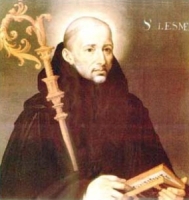
Adelelm, Adelhelm, Aleaunie, Aleaume, Alleaume, Elesmes, Lesmes
Manservant. Soldier for France, with a promising career. While on pilgrimage to Rome, Italy, he met Saint Robert at Chaise-Dieu monastery, Issoire. Soon after, Adelelmus retired from military life to become a Benedictine monk at Issoire under the spiritual direction of Saint Robert. Known as a miracle worker.
Adelelmus's reputation for holiness spread. Constance of Burgundy, Queen of Castile, Spain was so impressed by him that 1079 she and King Alphonsus VI of Castile built a monastery in Burgos, Spain on condition that he serve as its first abbot. He soon after added a church and hospital to the house. Joined in the war to drive the Moors from Spain.
One night, while out on some holy business, abbot Adelemus and his aide were caught in a storm. Adelelmus ordered his assistant to light a candle so they could see to finish their journey. Not only was he able to light the exposed candle in the rain, but it stayed lit throughout their whole wet, windy, stormy trip.
11th century at Laudun, Poitou, France
c.1100 at Burgos, Castilla la Vieja, Spain of natural causes
• Burgos, Spain
• butlers
• domestic servants
• housemaids
• maids
• manservants
• servants
https://catholicsaints.info/saint-adelelmus/
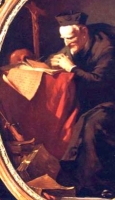
Apostle of Turin
Born to a poor family, he struggled for years to work his way through schools, finally graduating from the University of Turin. Joined the Oratory of Saint Philip Neri in Turin, Italy on 26 May 1651. Ordained on 24 February 1652. Received his Doctorate in Theology in 1656. Parish priest in Turin with a special ministry to the sick, the poor and the confessional. Confessor to Duke Victor Amadeus II of Savoy and other members of the nobility and royal court. He used these connections to improve charity to widows and ophans, and to procure the funding for the Basilica of Superga. Provost of the Turin Oratory for years. Offered the archbishopric of Turn, but declined. Had a great devotion to the Shroud of Turin, and supervised repairs to it in 1695. Supported catechists in the region, and taught catechism classes himself. Helped to found the Pontifical Academy of Ecclesiastical Nobles in Rome, Italy in 1701 to train diplomats for the Papal States.
9 March 1629 in Verduno, Duchy of Savoy (in modern Italy
• 30 January 1711 in Turin, Duchy of Savoy (in modern Italy of natural causes
• relics enshrined in a silver urn in the Oratory Church of Turin
31 August 1834 by Pope Gregory XVI
https://catholicsaints.info/blessed-sebastian-valfre/
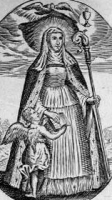
Adelgundis, Aldegonda, Aldegonde, Aldegondes, Aldegun, Aldegunais, Aldegund, Orgonne
Daughter of Saint Walbert of Hainault and Saint Bertilia; sister of Saint Waldetrudis; aunt of Saint Madalberta. Lived in the convent at Mons, Belgium with Waldetrudis. Benedictine abbess. Hermitess at Maubeuge Abbey; her cell became the core of a Benedictine monastery she founded, and she served as its first abbess. Visionary. Friend of Saint Humbert of Pelagius.
c.633 at Hainault, Belgium
• 30 January 684, probably of breast cancer, at Maubeuge Abbey, France
• buried there
• against breast cancer
• against cancer
• against childhood diseases
• against fever
• against headaches
• against pain
• against sudden death
• against ulcers
• against wounds
• cancer patients
• children learning to walk
• eyes
• Maubeuge, France
https://catholicsaints.info/saint-aldegundis/
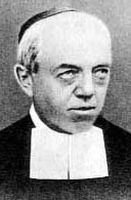
• Louis Wiaux
• Mucian Mary Wiaux
• Mucian of Malonne
• Mutien Marie
• The Praying Brother
Third of six children of a blacksmith whose family was noted for piety. Louis attended a small country school, and then helped in his father's shop. He joined the Brothers of Christian Schools on 7 April 1852 at age 11, taking the name Mutien Marie, and beginning his novitiate in Namur, Belgium. As a Christian Brother, he taught at several elementary schools near Brussels, Belgium; he was so easy on his students that his classes were known for getting out of hand. He was re-assigned to music and art classes so he could work with small classes, and work individually with students. He soon became an excellent fine arts teacher, and the one-to-one work led many young people to see and follow his excellent example of a holy life devoted to prayer.
20 March 1841 in Mellet, Hainaut, Belgium as Louis Wiaux
30 January 1917 at Malonne, Namur, Belgium of natural causes
10 December 1989 by Pope John Paul II
https://catholicsaints.info/saint-mutien-marie-wiaux/
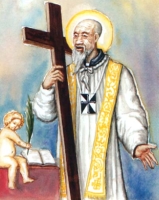
Thomas Khuong
24 November as one of the Martyrs of Vietnam
Born to the Tonkinese nobility, he was raised in a Christian home. Priest in the apostolic vicariate of Central Tonkin (modern Vietnam). Member of the Dominican Fraternity of Priests, and a tertiary. Imprisoned several times in the persecutions of Minh-Manh, but released. Arrested on 29 December 1859 in Tran Xa in the persecutions of Tu Ðuc. When he was ordered to stomp on a cross to show his refutation of Christianity, he instead kneeled and began to pray. Martyr.
c.1789 in Nam Hòa, Hung Yên, Tonquín (modern Vietnam)
beheaded with an ax on 30 January 1860 in prison in Hung Yên, Vietnam while kneeling before a cross he had been ordered to stomp on
19 June 1988 by Pope John Paul II
https://catholicsaints.info/saint-toma-khuong/
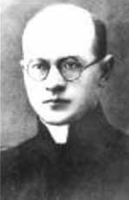
Segismundo, Sigismondo
12 June as one of the 108 Martyrs of World War II
Priest of the archdiocese of Lublin, Poland, leading a parish that refused to renounce Christianity during World War II. Father Zygmunt was arrested and beaten by the Gestapo who were looking for the Communists that had been persecuting the parish before the Germans arrived. Zygmunt knew that if he named them, the Communists would immediately be killed by the Nazis, so he refused to speak. Martyr.
24 April 1902 in Krasnystaw, Lubelskie, Poland
• shot on 30 January 1943 next to his parish church in Gdeszyn, Poland
• he died with a rosary in his hand
13 June 1999 by Pope John Paul II
https://catholicsaints.info/blessed-zygmunt-pisarski/
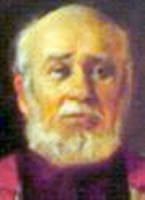
• Francis Tailler
• Proinsias Táilliúir
20 June as one of the Irish Martyrs
Born to the local nobility, son of Robert Taylor and Elizabeth Golding. Married laymen and father of six. Lord Mayor of Dublin, Ireland in 1595. Elected to Parliment, he was refused his seat due to being Catholic. Arrested in late 1613 or early 1614 for his faith. Martyr.
c.1550 in Dublin, Ireland
30 January 1621 in Dublin, Ireland
27 September 1992 by Pope John Paul II in Rome, Italy
https://catholicsaints.info/blessed-francis-taylor/
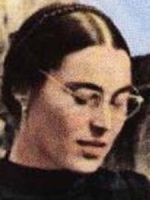
Lay woman in the diocese of Adria-Rovigo, Italy. In her youth she received a vision of Christ giving her three rings and five rubies; the rubies represented the Five Wounds. She left school while still a child, working to help support her family. She suffered from a number of debilitating conditions, and was subject to demonic possession.
21 October 1924 in Bosaro, Rovigo, Italy
30 January 1980 in Rovigo, Italy
7 September 2013 by Pope beatification recognition celebrated at the Piazza XX Settembre, Rovigo, Italy), presided by Cardinal Angelo Amato
https://catholicsaints.info/blessed-maria-bolognesi/
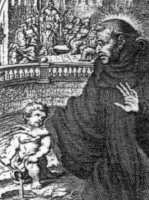
Doctor Universalis
Philosopher. Theologian. Renowned professor universities at Paris and Montpellier in France. Joined the Cistercians and lived as a exemplary monk at Citeaux, France. Wrote a number of theological, philosophical and apologetic works as well as poetry.
c.1120 in Lille, France
6 July 1202 in Citeaux, France of natural causes
https://catholicsaints.info/blessed-alan-the-great-of-lille/
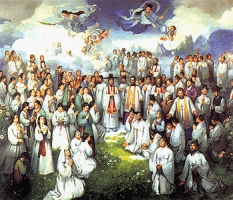
Heo Hyeob, Baolo, Paulus
20 September as one of the Martyrs of Korea
Layman soldier in the apostolic vicariate of Korea. When he admitted to being a Christian, he was imprisoned, tortured, and repeatedly dragged before a judge who ordered Paul to renounce his faith; he repeatedly refused. Martyr.
1796 in Seoul, South Korea
beaten to death on 30 January 1840 in Seoul, South Korea
6 May 1984 by Pope John Paul II
https://catholicsaints.info/saint-paul-ho-hyob/
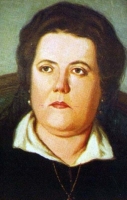
Lay woman in the archdiocese of Valencia, Spain. Catechist. Raped and martyred in the Spanish Civil War.
13 September 1888 in Nantes, Loire-Atlantique, France
burned alive on 30 January 1937 in Torrent, Valencia, Spain
11 March 2001 by Pope John Paul II
https://catholicsaints.info/blessed-carmen-marie-anne-garcia-moyon/
Teófilo, Teofil
Commander of the imperial Byzantine military outpost in Cyprus in the late 8th century reign of Constantine IV. During a naval attack by Muslim forces, he was captured, taken to the Saracen Caliph Harun ar-Rashid, imprisoned for four years in hopes of his being ransomed, and regularly ordered to renouce Christ and convert to Islam; he refused. Martyr.
beheaded with a sword on Cyprus on 30 January 792
https://catholicsaints.info/saint-theophilus-the-younger/
Nun at the convent of Mehrerau on Lake Constance in Italy.
• 12th century
• buried before the altar of Santa Catherine in the Basilica of Saints Peter and Paul at Mehrerau
• relics enshrined at the altar of San Giovannni in 1650 where they became a point of pilgrimage
• relics interred in the crypt of the abbots at Mehrerau in 1781
https://catholicsaints.info/blessed-aberilla/
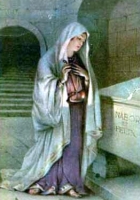
Sabina
Martyred for ministering to Christian prisoners and for burying martyrs during the persecutions of Diocletian.
Milan, Italy
311 while praying at the tomb of Saint Nabor and Saint Felix
https://catholicsaints.info/saint-savina-of-milan/
Barsimeus, Barses, Barsamva
Evangelizing bishop of Edessa, Syria. Martyred in the persecutions of President Lysias and Emperor Trajan.
114 in Edessa, Syria
https://catholicsaints.info/saint-barsimaeus-of-edessa/
Bishop of Pavia, Italy c.711.
• 732 of natural causes
• relics enshrined in the basilica of Saint Peter in Caelo Aureo, diocese of Pavia by King Liutprando
https://catholicsaints.info/saint-armentarius-of-pavia/
Anmchadh, Amnuchad
Migrated to Germany to become a monk, and then became a hermit at Fulda.
Ireland or Scotland (records vary)
1043
https://catholicsaints.info/saint-amnichad-of-fulda/
Martyred in the persecutions of Decius for refusing to take an oath to pagan gods.
stoned to death by a mob outside of Alexandria, Egypt in the mid-3rd century
https://catholicsaints.info/saint-metrano-of-alexandria/
Bishop of Jerusalem during a period of oppression by the Roman government, Jewish opposition, and general political upheaval in Palestine.
120 of natural causes
https://catholicsaints.info/saint-matthias-of-jerusalem/
An old man tortured and executed in the persecutions of Decius for repeatedly proclaiming his Christianity in public. Martyr.
in 251 in Edessa, Syria
https://catholicsaints.info/saint-alexander-of-edessa/
Habrilia
Hermitess near Mehrerau, Switzerland. She never joined an order, but vowed obedience to the Black Benedictine monastery at Mehrerau.
c.1100
https://catholicsaints.info/blessed-haberilla/
Mercedarian friar known for his piety and as a miracle worker.
San Lazzaro convent in Saragossa, Spain of natural causes
https://catholicsaints.info/blessed-ferrario-of-saragossa/
Tudy, Tudelyd, Tybie, Usa
Nun. A church in Dyfed, Wales is named for her.
Welsh
5th century of natural causes
https://catholicsaints.info/saint-tudclyd/
Priest. Renowned in Antioch, he was at one point a follower of the Novatian heresy. Martyr.
Syria
https://catholicsaints.info/saint-hippolytus-of-antioch/
Bishop of Antibes, Provence, France.
c.451 of natural causes
https://catholicsaints.info/saint-armentarius-of-antibes/
Marytred with 125 companions.
African
https://catholicsaints.info/saint-philippian-of-africa/
Marytred with 125 companions.
African
https://catholicsaints.info/saint-felician-of-africa/
• Pellegrino
• Peter of Bulgaria
CatholicSaints.Info Portable Edition